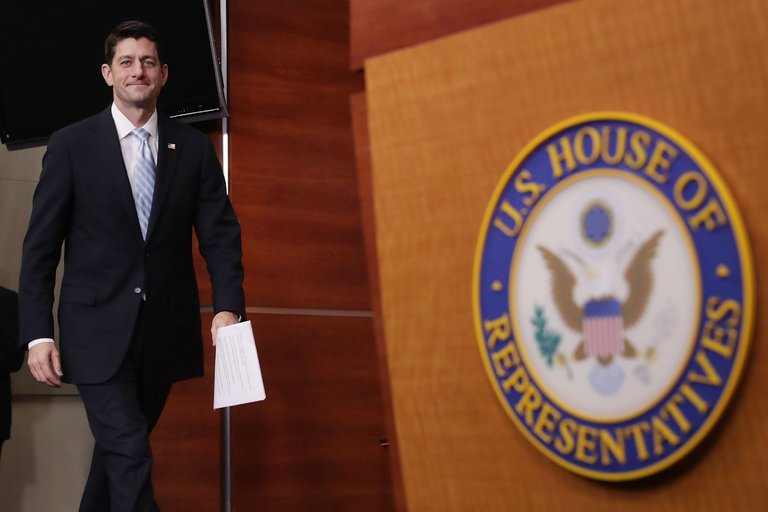
WASHINGTON — The House is expected to give final approval on Friday to a measure that would allow Republicans to speedily gut the Affordable Care Act with no threat of a Senate filibuster, a move that would thrust the question of what health law would come next front and center even before President-elect Donald J. Trump takes office.
The House vote would come after the Senate narrowly approved the same measure, a budget blueprint, early Thursday morning. Americans woke up Thursday to the realization that a Republican Congress was serious about repealing President Obama’s signature domestic achievement — a move that could leave 20 million Americans unsure of their health coverage and millions more wondering if protections offered by the Affordable Care Act could soon be taken away.
“This is a critical step forward, the first step toward bringing relief from this failed law,” Senator Mitch McConnell of Kentucky, the majority leader, said.
Democrats said the rush to repeal was the height of legislative irresponsibility and would endanger the health of millions.
“For the life of me, I can’t understand the need to take health care away from people, and why in the world anybody would even contemplate doing that without something to replace it,” said Representative Louise M. Slaughter of New York. “Just snatching it out from under them and it’s gone. I think that there’s going to be a mighty rumble in this country, an outburst of anger and fear.”
What comes next may be the most pressing problem facing Republicans, who may find that dismantling the health law is far easier than replacing it with one that can unite their fractious members — and win over some Democrats.
After a marathon session, the Senate voted 51 to 48 to approve a budget measure that would clear the way for the health care law to be repealed with a simple Senate majority. As the House approached its vote, some Republicans remained reluctant to act without a clear strategy to replace the health law.
“We’d like to see a little more flesh on the bone before we sign on the dotted line,” said Representative Andy Harris of Maryland, an anesthesiologist and a member of the conservative House Freedom Caucus.
Republicans skeptical of moving forward risked looking hostile to the repeal effort. And there was a prevailing sense of the importance of following through on a campaign promise upon which so many House Republicans had staked their political reputations.
“This is an issue that really and truly, in some ways, put two-thirds of our conference here,” said Representative Doug Collins of Georgia, a member of the party’s leadership team.
“Everybody wants to get it right,” he said.
Republican leaders sought to reassure members that the House budget vote — procedurally important as it is — is only the first step in an exhaustive process to repeal and replace the Affordable Care Act. Four committees in the House and Senate would then be tasked with drafting the legislation that would gut the existing health law.

The concerns fostered a remarkable alignment between some centrist Republicans and their counterparts in the House Freedom Caucus, the hard-right group that is disposed to disagree with its own party’s leaders.
Speaker Paul D. Ryan of Wisconsin worked to soothe concerns even as he expressed the urgent need to get rid of a law that Republicans hate. Republicans would embark on “a thoughtful, step-by-step process,” he said, even though the law is “collapsing while we speak.”
Mr. Ryan also said he was working with Mr. Trump and Vice President-elect Mike Pence. Mr. Trump called this week for a near simultaneous repeal and replacement of the Affordable Care Act.
“We are in complete sync,” Mr. Ryan said.
But Republicans face a significant challenge in passing the necessary legislation to replace the health care law. They can repeal major parts of the existing law without facing a filibuster, but they would not be able put in place a full replacement in the same measure, because arcane budget rules limit what can be included in such a filibuster-proof bill.
Instead, they would almost certainly need to pass another bill or multiple bills with 60 Senate votes, and that would require at least some Democratic cooperation.
Senator Joe Manchin III, Democrat of West Virginia, a prime target for Republican wooing, asserted on Thursday that Mr. Trump did not want to “repeal” Obamacare but “repair” it. He cited Mr. Trump’s stated support for popular provisions like requiring insurers to provide coverage for people with pre-existing medical conditions.
“We’re in a repair mode,” Mr. Manchin said. “They need 60 votes to repair. I’m actually happy to work with them.”
Republicans in Congress have offered many replacement ideas, but it is not clear whether their most conservative members will ever be able to agree on legislation acceptable to the party’s moderates.
A manifesto issued by House Republicans in June outlined a consensus proposal, produced by the chairmen of four House committees, including Representative Tom Price of Georgia, chosen by Mr. Trump to be secretary of health and human services.
Mr. Trump and congressional leaders said they were counting on Mr. Price to help them write a replacement for the Affordable Care Act, most likely drawing from a bill that he introduced in July 2009 and has reintroduced several times since.
“I think there’s an acknowledgment both by the administration coming in and people around here that his imprint needs to be on this,” Senator Bob Corker, Republican of Tennessee, said.
Senate Republicans do not have a detailed plan. But Senator Lamar Alexander of Tennessee, chairman of the health committee, laid out a road map on the Senate floor this week that pointed to a measure potentially more expansive than House plans.
INTERACTIVE GRAPHIC
How Republicans Can Repeal Obamacare Piece by Piece
Peeling away pieces of the law could lead to market chaos.

The major Republican proposals have not been analyzed by the Congressional Budget Office, so no independent or authoritative estimates exist of their costs or the number of people who might gain or lose coverage.
On several points, the major Republican proposals agree.
They would eliminate the requirements that most Americans carry health insurance and that larger employers offer it to employees.
They would offer tax credits for health insurance and new tax incentives for health savings accounts; provide subsidies for state high-risk pools, to help people who could not otherwise obtain insurance; and make it easier for insurance companies to sell policies across state lines.
They would also provide some protection for people with pre-existing conditions who have maintained “continuous coverage.” They could not be dropped by an insurer and could move from one plan to another, but a person with a pre-existing condition seeking insurance after a lapse of coverage could in some cases be charged higher rates. The protections would be weaker than those in the Affordable Care Act.
Republicans also do not agree on how to pay for a replacement plan. In the House document, Republicans proposed limiting the value of tax-free health benefits that employers could provide to employees.
Under the current law, employees do not have to pay federal income tax on contributions that employers make to their health insurance. House Republicans said this open-ended subsidy had encouraged people to select more expensive coverage, driving up premiums.
But business groups, labor unions and some conservative lawmakers vehemently oppose that change, saying it amounts to a new tax on benefits and on working families. Senate Republicans have also not expressed support for the idea.
Many House Republicans, including Mr. Price, would provide tax credits to help people buy insurance. But the amount of assistance would increase with age and would not be tied to income, as it is under the existing health care law.
The subsidies would probably be smaller than under the Affordable Care Act. But insurance would be less expensive, Republicans say, because the government would impose fewer requirements.
Mr. Alexander said he would “allow individuals to use their Obamacare subsidies to purchase state-approved insurance outside the Obamacare exchanges.” Under the health care law, such assistance can be used only in the insurance exchanges.
Many Republicans say states should have much more power to define “essential health benefits.”
On Medicaid, the federal insurance program for low-income people, House Republicans would roll back the Affordable Care Act’s expansion and give each state a fixed amount of money for each beneficiary — or a lump sum of federal money for all of a state’s Medicaid program.
But more than half the states, including some with Republican governors, have expanded Medicaid eligibility under Mr. Obama’s law, with large sums of federal money, and pragmatic Republicans are reluctant to snatch away the federal money that has allowed big increases in Medicaid enrollment.
[Source:-The New Yourk Times]




